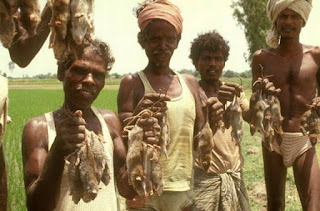Rodent welfare in the name of prevention of cruelty to animals?
According to Animal Welfare Board of India,
Department of Animal Husbandry and Dairy, Govt of India letter No. 9-16/2019-20-PCA
of 16th Nov 2020, killing rodents using glue traps is inhuman, as it inflicts
unnecessary pain and suffering to the rodents. It is a recurring cruel
practice. And this is against the Prevention of cruelty to Animals Act 1960.
Rodents cause damage to crops as well as in storage of food grains. I remember probably in 1970s my relative telling me that their wheat crop was totally destroyed by rodents. I am not sure of status of rodents causing losses in agriculture or carrying diseases to the humans. Surely, way back in 1994 that we had plague in Surat and some people died, part of the blame was on rodents spreading disease.
Some communities all over the world like to eat rats. In India, Adi in the North east and Erula and Korava in the South are expert rat catchers and eaters. There are also Musahars, rat catchers in the North especially in Bihar, Jharkhand, Uttar Pradesh and West Bengal who eat rats during dire conditions, as report in the dueexpress.com on 11th September 2020 suggests. A report of the 10th July 2016 in Hindu suggests that rat trapping is an efficient method of preventing losses and even recovering hoarded food grains from burrows than killing rats with poisons, as found in the DST project on the subject. And this may be considered a very humane method, as it does not involve conventional rat poisoning.
Rat catchers, photo Rom Whitakar photo credit:
mail.pic.dcv from Hindu report
At the extreme end, is also a fact that some
communities for e.g. in Rajasthan worship rats. There is Karni Mata Mandir
(temple) (photo credit: Wikipedia) in Deshnoke, 30 km away from Bikaner where
rats are worshipped. About 25000 black rats live and are fed here. Legend has
it that son of Karni Mata drowned in the pond. Karni Mata, devotee, implored
the Death God, Yama to bring back to life her son. Yama relented later and
reincarnated her son as rat. The devotees worshipping at this temple believe
that eating food nibbled by rats is honour bestowed on them.
Karni Mata temple-photocredit Wikipedia.org
So, it is question of striking a balance between
rodent control with human and inhuman methods-in the absence of clarity of what
constitutes human or inhuman method. Both ends in death. Is death painful, cruel? Rats
are not human to tell you. In the end, it is whose welfare that you intend to
look for, while managing their population not exterminating them. Rats or
Humans!
Jai Ho.





Comments
Post a Comment